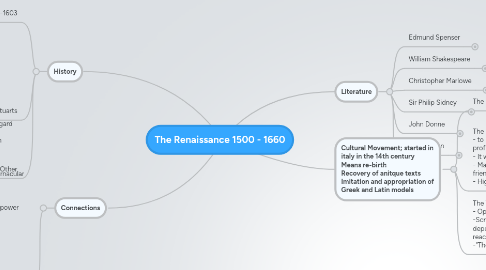
1. History
1.1. The Tudors 1485-1603
1.1.1. Henry VII 1485-1509
1.1.1.1. Focused on good business instead of war Believed that trading would make England great Well liked king
1.1.2. Henry VIII 1509 - 1547
1.1.2.1. Wanted to become an important influence in European politics Wasted all the money his father had made Started the reformation: -He disliked the Church because they had money he could not touch and they would not let him divorce his wife -Convinced the bishops to make him head of the Church in 1531 - Made England a politically protestant country even though the most popular one was Catholic, which Henry himself was. - Closed down loads of monasteries and churches to make money
1.1.3. Edward VI 1547-1553
1.1.3.1. Was only 9 years old when he got the throne and England was therefore ruled by a council. Everyone on the council had reached their power by being protestant reformers when Henry sold the Church's land, so to be sure that they could keep their land and power they wanted to make sure that England stayed protestant.
1.1.4. Mary 1553-1558
1.1.4.1. Catholic Married King Philip of Spain which was unliked by most Began burning protestants
1.1.5. Elizabeth I 1558-1603
1.1.5.1. - Was most like Henry VII - Wanted to bring the religious groups together and make England prosperous - Faced several Catholic plots which made the public opinion change and when she executed Mary Queen of Scots most believed that being Catholic was being an enemy of England - Focused on encouraging merchant expansion - Defeated the Spanish armada in 1588
1.2. The Stuarts
1.2.1. James I (James VI of Scotland)
1.2.2. Charles I
1.2.3. Charles II
1.2.4. Summary
1.2.4.1. They were not at all as successful as the Tudors Charles I even got executed Led to England being a republic for 11 years Oliver Cromwell Lord Protector Charles II asked to come back and rule
1.3. Other
1.3.1. Englishmen started colonies abroad Began selling slaves
2. Connections
2.1. Greek and Latin work held in high regard - Many works were more or less translations of classical greek/roman literature. The reformation -> demoted Latin - The literature was written in the vernacular Literature was mainly for the people in and around the court - Most works are about people with power - (Changed somewhat with the invention of the printing press) The theatre was open for the public - The plays had to work for both aristocrats and the common people Universities not open for women - No female writers
3. Literature
3.1. Edmund Spenser
3.1.1. The Shepheardes Calender
3.1.2. The Fairy queen
3.1.2.1. The great epic of the period epic: long narrative Dedicated to the Queen Based on Homer's "Odyssey", Virgil's "the Aeneid and several other classical and Italian models. Adapts tradition to English context: English national epic, written in English, for Christian (protestant) readers. The nation's history Heroic deeds and adventures References to historical events and figures
3.2. William Shakespeare
3.2.1. Family of good social standing but not aristocratic Local grammar school
3.2.2. Plays: Historical dramas: Richard II, Henry IV, Henry V Comedies: A Midsummer Night's Dream, As You Like It, Twelfth Night Tragedies: Hamlet, King Lear, Macbeth, Othello "Romances": Cymbeline, The Winter's Tale, The Tempest
3.3. Christopher Marlowe
3.3.1. Educated at Cambridge Classical learning reflected in plays and poetry
3.3.2. Tamburlaine Dr faustus The Jew of Malta
3.4. Sir Philip Sidney
3.4.1. Educated at Oxford Knight, soldier, poet Closely connected to the court
3.4.2. Arcadia The Defence of Poesy Astrophil and Stella
3.5. John Donne
3.5.1. Chatolic family Converted to the church of England Dean of St. Paul's Cathedral
3.5.2. Songs and sonnets -Themes of love and religion -"Learned poetry" -Not conventional sonnets
3.6. John Milton
3.6.1. Educated at cambridge Religious and political work Modelled his writing career on Virgil Puritan secretary yo Cromwell's Ptrotectorate Sonnets -Political, religious and personal themes
3.6.2. Paradise Lost -Epic, but departs from tradition The fall of Adam and Eve The battle between God and Satan Moral values Questions/re-evaluates heroic ideals
4. Cultural Movement; started in italy in the 14th century Means re-birth Recovery of anitque texts Imitation and appropriation of Greek and Latin models
4.1. The Renaissance in England
4.1.1. Period of change and tradition in politics, religion, society, cultural life
